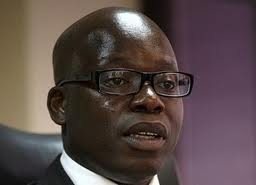5 BUSINESS LESSONS I LEARNT FROM WALE TINUBU, OANDO CEO

I am an avid fan of Jubril Adewale Tinubu, Group CEO of Oando Plc, since 2001, when I first came across his face and name in the newspapers. I was a year one student in the university when the name stuck to my consciousness. By stroke of fate, he would later be my employer for four years post-university, before moving on. He remains a businessman I respect. In this article, I highlight business and life lessons I learnt from the Lagos-born oil mogul dubbed by Forbes Magazine as the King of African Oil.
1, YOUR FRIEND MAY BE YOUR BEST BUSINESS PARTNER
Many people don’t know that Wale Tinubu and his deputy, Mofe Boyo (both born 2 months apart in 1967) are childhood friends. They both read Law. They, alongside another friend Jite Okoloko (now of Notore Chemicals) formed Ocean and Oil, in 1994 at 27 years. The Delta man manages the internal affairs of the company, while the Lagos man is the public face of the company. A perfect combo if you ask me. That your bossom friend may be your best business partner.
2, NO CONTROVERSY IS TOO GRAVE FOR A BUSINESS TO SURVIVE
At least twice a year, there is a controversy about Wale Tinubu as a person or Oando as a company, but the man scales them like a piece of cake. Controversies, real or made up, are toxic to any business, or businessman. But the 48 year old aces them with ease. Some examples of the many controversies: that Oando means Obasanjo and others, that Bola Tinubu owns Oando, that Oando was indicted in subsidy scam, the tax evasion allegation, the Ibori connection controversy, and, recently, that Oando hoarded fuel to de-market Jonathan. Many controversies, most, if not all, unfounded. And the gentleman remains unruffled. He goes on with his business hardly affected. Talk of building a controversy-proof brand.
NOTE: Last year or so, a Wall Street Investment analyst, having come across on the internet a 2013 article I wrote on the man, once contacted me via LinkedIn for my comment on the gentleman (shortly after ConocoPhillips acquisition, I think). Of course, I gave a positive, honest review.
3, INORGANIC GROWTH STILL TRUMPS ORGANIC
Inorganic growth refers to expanding your business interests by way of business combinations, notably mergers and acquisitions. Organic is growing it internally. Oando is what it is today because of various acquisitions over time – Unipetrol in 2001, Agip downstream in 2002 and ConocoPhillips in 2013. Wale Tinubu now sits atop a massive oil empire. His acquiring Unipetrol and Agip made him conquer downstream, and he moved to acquire ConocoPhillips to become a dominant local player in upstream. If you have the funds, inorganic growth is a faster route to business stardom. Just don’t fill your bucket with more than you can carry.
4, MONEY IS NOT ENOUGH
Some people believe money is everything. Big fat lie. Money is not everything in business. A simple example: The Federal Government of Nigeria sold Unipetrol and National Oil to Wale Tinubu and another top businessman respectively at around the same time. They both play in the same market. The other businessman is widely regarded as far richer than Wale Tinubu (moreso in the early 2000s when they bought the companies). Today, Wale-revamped Oando is far ahead of the other company in market leadership, despite the owner having more funds to play with. Many other examples abound of companies backed by billionaires with surplus cash not being able to compete with those promoted by those that are not exactly as rich in the same market.
5, DO LAWYERS MAKE GREAT CEOs?
Most of the smartest CEOs in the world read Law. Obama did. Clinton did. Subomi Balogun? Aig Imhoukhude? I don’t believe it is a coincidence that Wale Tinubu and his deputy are both lawyers. I think lawyers are smart and make great CEOs. But make sure you don’t go the way of a certain Cambridge-trained fiction vendor in Nigeria’s political space.
***
See also: 9 MANAGEMENT LESSONS FROM ATEDO PETERSIDE, IBTC FOUNDER
Grab a copy of my book, The Road to Victoria Island – A Practical Guide to Climbing Career Ladder in Corporate Nigeria
Subscribe to JarusHub for more management and career articles
[subscribe2]
Established in March 2013, JarusHub is a Nigerian information hub with focus on career and management. It is rated Nigeria's most authoritative destination for online career resources. It parades an array of Nigerian professionals who share their career experiences with a view to bridging career information gap and mentoring a generation to success. Whether you're a student, a recent graduate or an established professional, or even an executive, you will always find something to learn on JarusHub. All enquiries to jarushub@gmail.com or 0808 540 4500. Facebook: www.facebook.com/jarushub; Twitter: @jarushub or @mcjarus.
Career Q&A with Jarus: Oil & gas career, poor CGPA
September 17, 2023What is Career Counselling? How to choose the Right Career?
October 24, 2022
5 comments
Let us have your say by leaving a comment belowCancel reply
Recommended For You
-
HOW TO QUIT BANKING JOB AND RETURN TO ENGINEERING
August 5, 2014 -
TOP FIVE(5) QUESTIONS ASKED IN FLOURMILLS INTERVIEW
May 10, 2018







Always nice to read about Nigerian entrepreneurs who show that hardwork counts.
Yes. Lawyers make great leaders generally. Sometimes I think more law should be taught to non-law students in secondary and tertiary schools.
Soon l will write my own.
7 lesson l learnt from JERUSHUB.
Hmmmmm, Wale Tinubu, hardworking and smart fella, RESPECT.
Hmmm. Inorganic and Organic growth! Lesson learnt! Thanks
Hmmm. Inorganic and organic growth! Lesson learnt. Thanks. Inspiring post.